Marikana: 'My husband died in vain'
- Published
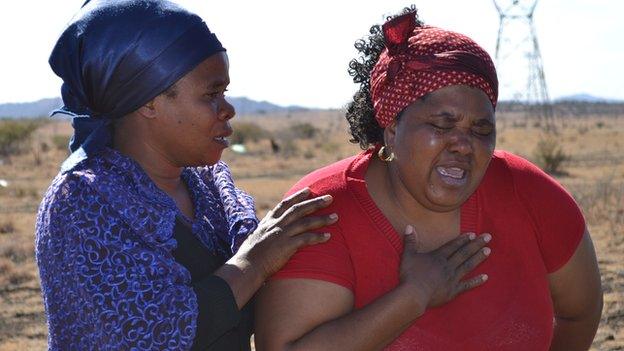
The widows of the miners who were killed by the police want the men to be arrested and punished
It is a year since South African police shot dead 34 striking miners at the Marikana mine, shocking the nation and the world. The BBC's Pumza Fihlani looks at how the killing has changed the country.
It is a chilly winter's day and widows Nonkululeko Ngxande, 32 and Zameka Nungu, 40 have returned to the place where their husbands breathed their last and they are shocked by what they see.
The white wooden crosses that had been erected in memorial of the dead miners are now lying neglected in a pile at the bottom of the rocky hill - some have even broken.
"Our husbands were killed like dogs. We are widows today because of the police and yet no-one has been arrested for their deaths," says Ms Nungu, tears gushing down her face.
"No-one cares about the men who died here because they were nobodies," she continues, her eyes red from crying.
The widows believe the desecrated crosses are telling - a reflection of how little the deaths of their beloved husbands have meant to those blamed for them - mine owner Lonmin, the police and the government.
It has been a year since Ms Ngxande's husband died but the pain of losing him is still etched on her face. Her voice shakes when she speaks about him.
"I have no-one to support me. My husband worked hard to take care of me and our two children. We had dreams and they all died the day he was killed," she sobs.
Her husband Mpumezi Ngxande was 36 when he died. He was a rock-drill operator from Ngqeleni, an impoverished village in the far-off Eastern Cape.
He had struggled for years to find work and the family had seen his job as a chance for a better future, his wife tells me.
But in August 2012, he and other miners embarked on an unofficial strike to demand 12,500 rand ($1,260; £810) a month, claiming that many of them were paid as little as 3,800 rand despite years of hard work, often under dangerous conditions.
The week before what is now referred to as the "Marikana massacre", 10 people were killed in violent clashes, including two police officers and two security guards who were hacked to death, allegedly by miners.
On 16 August, police opened fire on a crowd of strikers, later saying they had been "overwhelmed".
When the dust had settled minutes later, 34 dead bodies lay on the ground and 78 were wounded.
Disturbing scenes as police fire at miners in South Africa
The dead miners were from the Eastern Cape and Western Cape provinces, Lesotho and Swaziland.
Unrelenting poverty
The Institute of Security Studies says the shooting in Marikana brought into sharp focus the inadequate training of many South African police officers.
"We know from an internal report released last year that something in region of 27,000 police officials are not trained properly. So this complete denial of problems [by the police commissioner] - this is very dangerous as it means these problems are not being fixed," the institute's Gareth Newham told the BBC.
Ms Nungu says her husband Jackson Lehopa, affectionately known as "Ace", was a father of six, a family man. Ms Nungu says the police should have handled the matter differently.
"My husband was shot nine times. He had five wounds on his back, his leg was full of bullet holes. What would make someone do this to another human being," she cries.
Both women are unemployed and say they depend on government grants and help from family members to feed their families.
But what has changed in Marikana? The short answer is nothing, according to the miners who work here.
"Nothing has changed here, in fact things have gotten worse. We are fearful to even miss work for a day let alone strike because we might be suspended. Things are much harder now than they were before the strike," says Bongani, a rock-drill operator who has been working at the mine for nine years.
South Africa is the world's largest platinum producer and a majority of the country's reserves are found in this area.
Many of the men and women who bring the world's priciest mineral to the surface of the Lonmin mine live in Ikaneng, a township of shacks and a handful of newly built brick houses.
The dusty, narrow streets are riddled with potholes, scrawny dogs fight over the mounds of rubbish on street corners and burst sewerage pipes and overflowing drains add to the grim picture here.
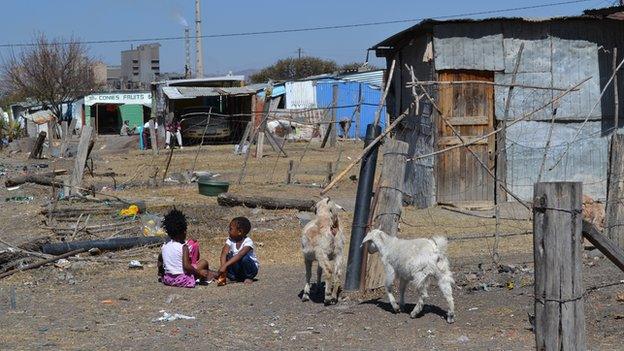
South Africa is said to be one of the world's most unequal societies and the gap between the haves and the have-nots is getting wider.
The millions of black South Africans who voted into power the African National Congress (ANC) to end white minority rule hoped this would dramatically improve their living standards.
The miners here are no different. The country's mining industry is more than 100 years old but some say little has changed since gold was first mined from the Main Reef in Witwatersrand - later to become Johannesburg - in 1885.
Black migrant men would spend hours underground in small congested and unventilated spaces, while a white foreman bellowed out orders.
Peter Alexander, author of Marikana: a View from the Mountain and a Case to Answer, says there is often "racist pressure in the mines".
"When they [white supervisors] come along and they point their fingers and tell the [black] workers what to do, there is still recognition that things have not changed much since the end of apartheid," he told the BBC.
Lonmin says it is "rigorous in addressing all forms of victimisation" and says any incidents of racism should be reported to its anonymous hotline.
Mr Alexander, a professor of sociology at the University of Johannesburg, says Marikana was a turning point in South African's history, although it is yet to lead to a change in government policy.
"It changed the mood in the country. It's making an impact in terms of the way in which people look at the ANC, a shift where they no longer see it as the party that led the struggle for liberation but now as a party that is involved in supporting the oppression of ordinary workers," says Mr Alexander.
At the time of the killings, Cyril Ramaphosa, who is now ANC deputy president, was on the Lonmin board.
What has been learned?
The miners are weary of speaking to the media but tell me that there are tensions in this small community - at the heart of which is a rivalry between the National Mineworkers Union (NUM), which is allied to the ANC, and the newly formed Association of Mineworkers and Construction Union (Amcu).
Over the past year, at least 12 people have been killed around Marikana - eight of them prominent union members. Both unions are now calling for an end to the violence.
"There is a lot of fear and suspicion in this community. You just don't know who is going to be next," says a rock-drill operator, who only identified himself as Mzi.
Union leaders have been at pains to remind people that the protests on 16 August were about being paid a living wage and better living conditions - but they agree that their rivalry has often overshadowed this.
"The workers in South Africa are still subjected to poverty, the wealth that they are mining they are not benefiting from it. It's time for investors to look at their dividends, how can they share back and plough back to the workers," says AMCU leader Joseph Mathunjwa.
Last year's strike ended with a wage offer of 22% and a one-off bonus of 2,000 rand but workers this week told me that not all the miners had received the increase.
"I still earn 7,000 rand before deductions. This is the same amount I had been getting before we went on strike. I don't know who got an increase but I didn't and I know many of my colleagues who also didn't get the promised raise," said a miner who did not wish to be named.
Lonmin says it is working on improving the lives of its employees.
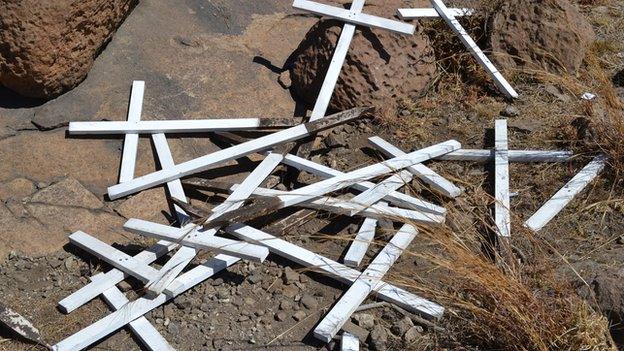
The government has been criticised for not doing enough for the miners and their families since the shooting
The events leading up to the killings on 16 August are being investigated by a commission of inquiry headed by Judge Ian Farlam set up by President Jacob Zuma to shed some light on who is to blame for the deaths, amongst other things - but a year later there are still no clear answers.
President Zuma's government has been criticised for not doing enough for the miners and their families since the killings - a sentiment Ms Nungu shares.
"Zuma's home in Nkandla is the size of a town and we his people are living in old small shacks. This government doesn't care about us and yet we were widowed by its officers," she says.
The government has been working on a deal that would require companies to improve the conditions of miners, bring stability to the mining industry and also allay investor fears.
But companies say with rising costs of production around the world and shrinking profit margins, they cannot afford to give workers drastic wage increases.
The unions have also not signed up to the deal and critics say it will be yet another piece of paper that will do nothing to address inequality.
"We have worked for years on this mine and yet we are still suffering. The strike ended but we didn't get what we wanted. Our colleagues died for nothing," says Ntsako Mashimye, who has worked at the mine for four years.
- Published21 April 2013
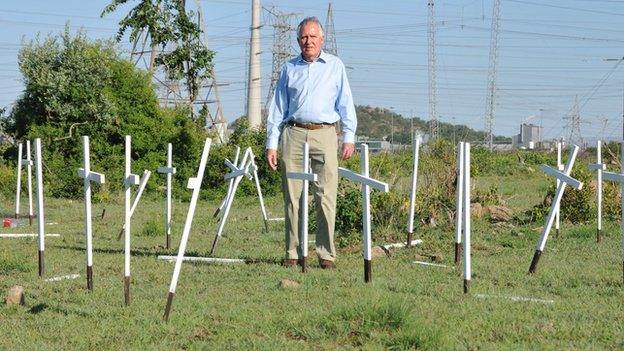
- Published20 September 2012
- Published18 September 2012
- Published3 September 2012
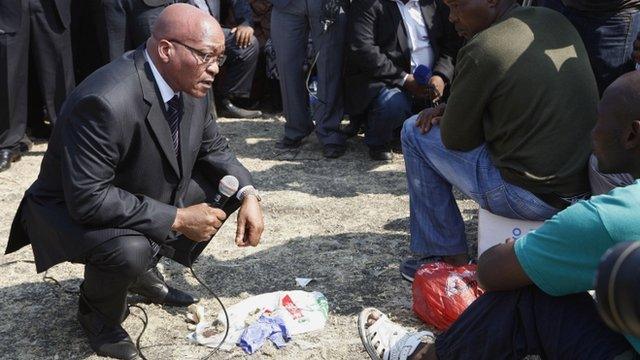
- Published21 May 2013